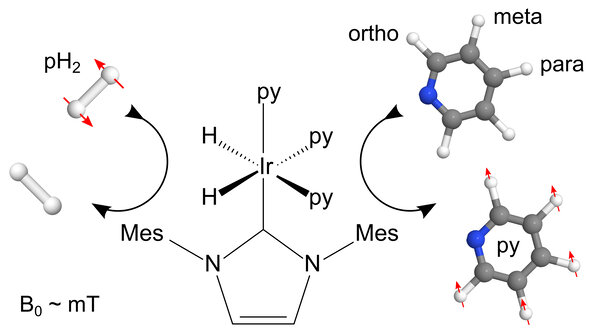Continuous Hyperpolarization or A Hyperpolarized Equilibrium
Hyperpolarization, ie. the use of (N)MR's vast but hidden potential, holds great promise to enable entirely new applications for MR from Chemistry to Medicine. Thus far, however, most hyperpolarization methods struggle with three major challenges:
(1) The limited life time: The hyperpolarized state decays with time with a mono-exponential time constant of the order of 10 - 100 s. Thus, all measurements must be fast, as must be any function investigated by hyperpolarized markers.
(2) The single-use character: Generally, each molecule is hyperpolarized only once. Signal averaging, ie. multiple acquisitions of the signal of one molecule is generally not possible. In addition, the excitation and thus acquisition of MR signal destroys the hyperpolarized state.
(3) The need to hyperpolarize agents externally, i.e. in a polarizer outside of the object to be investigated (e.g. a human or cell culture). This external production requires subsequent administration of the hyperpolarized agent after its production, which causes time- and thus signal loss. Further more, the amount of substance which can be added to an organism is limited.
In this project, we investigate the potential of continuous hyperpolarization by means of SABRE at a constant low field to address these challenges.
In contrast to earlier SABRE studies, the sample is not transferred to high field for detection, but held at the low magnetic field where the SABRE spin-order-transfer is efficient. We use our own low-field setup to conduct NMR experiments, as well as a commercial field-cycling device for MRI.
Our recent results were published open access in nature communications (link).

Figure 1:Schematic view of SABRE hyperpolarization. Given the approriate conditions, the polarization of the target molecule (right) is continuously renewed using the spin order of parahydrogen (left)
Dr. Andreas B. Schmidt
Head of Hyperpolarization
Tel.: +49 761 270-93880
E-Mail: andreas.schmidt@uniklinik-freiburg.de
University Medical Center Freiburg
Dept. of Radiology · Medical Physics
Killianstr. 5a
79106 Freiburg

